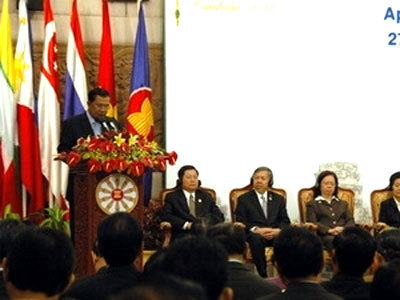
Cambodian Prime Minister Hun Sen speaks during the opening
ceremony of the 44th Association of Southeast Asian Nations (ASEAN)
Economic Ministers (AEM) meeting in Siem Reap City on 27 August 2012.
The Straits Times (ANN) - Faced with a slowing Chinese economic
locomotive, Hong Kong is looking south for an alternative engine of
growth.
It is hoping to gain unfettered access to Asean's market of 600 million people, by being included in an existing free trade agreement (FTA) between the bloc and mainland China.
But some Asean members including Singapore are calling for Hong Kong and China to sweeten the deal, such as by lowering tariffs on services and investments on the mainland for Asean firms.
The subject will be up for discussion during a meeting of Asean's economic ministers and their dialogue partners in Siem Reap this week. The meeting marks the first gathering of Asean members since a foreign ministers' meeting last month ended in disarray over disputes in the South China Sea, exposing deep divisions within the bloc.
It is hoping to gain unfettered access to Asean's market of 600 million people, by being included in an existing free trade agreement (FTA) between the bloc and mainland China.
But some Asean members including Singapore are calling for Hong Kong and China to sweeten the deal, such as by lowering tariffs on services and investments on the mainland for Asean firms.
The subject will be up for discussion during a meeting of Asean's economic ministers and their dialogue partners in Siem Reap this week. The meeting marks the first gathering of Asean members since a foreign ministers' meeting last month ended in disarray over disputes in the South China Sea, exposing deep divisions within the bloc.
China is bringing to the table a new study commissioned by the Chinese General Chamber of Commerce here, and conducted by Malaysian think-tank Asian Strategy and Leadership Institute (Asli).
It projected that if Hong Kong joins the FTA, the third-largest in the world by gross domestic product (GDP), the hike in trade volume would boost the GDP of all Asean states except Singapore's.
Vietnam and Cambodia will benefit most, followed by Malaysia, the Philippines and Thailand. Singapore will be the only one adversely affected, said Asli's Dr Michael Yeoh, who did the study.
He declined to reveal the size of the impact, telling The Straits Times it amounts to "0.0x" per cent of Singapore's GDP.
On why this is so, he said Hong Kong firms want to invest in the developing Asean economies, for instance, in areas like logistics, and encourage them to set up headquarters in Hong Kong. This poses competition to Singapore, a logistics hub and a venue for regional headquarters.
Meanwhile, as Hong Kong and Singapore are both already open economies with minimal barriers, there are few resulting tangible benefits to Singapore companies.
Lee Yi Shyan, Senior Minister of State (Trade and Industry), told The Straits Times that Singapore supports greater economic integration but China should offer something in return. "Given the similarities between Hong Kong and Singapore, an amount of competition is unavoidable. The question is, how can we find a way to strike a win-win situation?
"And if Hong Kong alone cannot make that offer, then we will see if the China side can provide some of the potential benefits to make this a more favourable deal for Asean members."
This, he said, could include looking at how China's services industry can be opened further to Asean companies.
The other concern is if Hong Kong joining an existing pact sets a precedent. Said Lee: "This is an important technical and procedural question as there are very few precedents.Would it mean a renegotiation of an FTA already in existence?"
The agreement between Asean and China was signed in 2002, and came into effect in 2010.
China-Asean Business Council executive secretary-general Xu Ningning said Hong Kong with its experience in logistics will benefit Asean with its inclusion. As it is, trade between Asean and China "cannot avoid the involvement of Hong Kong too - many (instances) happen at its ports".
Currently, 40 per cent of Hong Kong's trade is with China, over 30 per cent is with the United States and Europe, while 15 per cent to 20 per cent is with Asean.
But with China seeing a slowdown, the city is looking to offset it by latching on to Asean's growth, said National University of Singapore economist Shandre Thangavelu, who will be presenting another study commissioned by the Asean Secretariat today.
"Hong Kong is looking for another growth source for the next 10 years," he said. "So if they want to couple on to Asean's connectivity plan, now is the time."

No comments:
Post a Comment